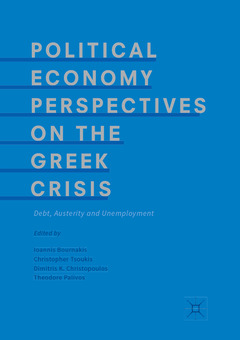Political Economy Perspectives on the Greek Crisis, 1st ed. 2017 Debt, Austerity and Unemployment
Coordonnateurs : Bournakis Ioannis, Tsoukis Christopher, Christopoulos Dimitris K., Palivos Theodore

This book offers a comprehensive guide to the on-going Greek debt crisis. It identifies and explains Greece?s idiosyncratic weaknesses, and highlights the existing rigidities in the EU architecture that make the recovery prospects of the Greek economy challenging.
Chapters from expert contributors highlight aspects of the performance of the Greek economy with focus on export performance, labour market conditions, political cycles and regional income disparities. The book then goes on to outline the banking system in Greece in the post-crisis era, and includes analysis that explains how the credit rating score affected Greece?s borrowing capacity prior to the start of the insolvency crisis. The final part analyses and compares alternative scenarios of fiscal consolidation, seeking to identify whether there are alternatives to fiscal austerity and the impact of each one of them. This section also clarifies various misconceptions about the significant determinants of international competitiveness. Despite the focus of the book, the lessons drawn from the chapters are not limited to Greece.This volume will be of interest to academics, practitioners and policy makers who wish to take a closer look at the Greek debt crisis and learn more about the challenges the Greek economy is currently facing.
Ioannis Bournakis is Senior Lecturer in Economics at Middlesex University, UK. He has an MSc in Economics and Econometrics from the University of Manchester, UK and a PhD in Economics from the University of Kent, UK. His research interests are in the fields of international trade, economic growth and applied macroeconomics.
Christopher Tsoukis is Senior Lecturer in Economics at Keele University, UK, specialising in macroeconomics. His research interests include behavioural and social macroeconomics, fiscal policy, political economy and the economy of Greece.
Dimitris K. Christopoulos is Professor of Economics at Panteion University in Athens, Greece. Dimitris has a BA in Economics from Athens University of Economics and Business, and a PhD from Panteion University. His main research interests are in the areas of economic growth, economic development, microeconomics and non-linear models.
Theodore Palivos is Professor of Economics at Athens University of Economics and Business and Senior Fellow at the Rimini Center for Economic Analysis. He has a PhD from Penn State University, US. His current research interests are in the areas of labour economics, macroeconomics, and public economics.
Offers an economic explanation to the failures of both the Greek economy as well as systemic failures of the euro architecture and the operations of EU authorities
Brings together contributions from economists with a wide range of expertise
Contributes to the on-going public debate about the sources of failure of other peripheral EU countries in providing economic prosperity since 2008
Provides a balance of theoretical argument, empirical evidence, and a range of perspectives on the Greek case
Includes supplementary material: sn.pub/extras
Date de parution : 08-2018
Ouvrage de 388 p.
14.8x21 cm
Disponible chez l'éditeur (délai d'approvisionnement : 15 jours).
Prix indicatif 121,31 €
Ajouter au panierDate de parution : 12-2017
Ouvrage de 388 p.
14.8x21 cm
Disponible chez l'éditeur (délai d'approvisionnement : 15 jours).
Prix indicatif 168,79 €
Ajouter au panier


